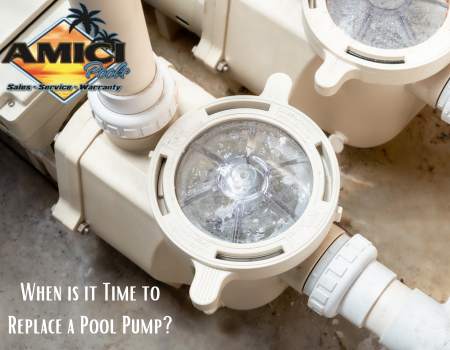The pool pump is the heart of your pool system, silently working behind the scenes to circulate water, ensuring proper filtration and sanitation. But like any hardworking appliance, even the most reliable pool pump eventually reaches the end of its lifespan. Knowing when to replace your pool pump is crucial to maintaining a healthy and inviting pool environment.
The Average Lifespan of a Pool Pump
Pool pumps typically have a lifespan of 8 to 15 years , depending on several factors such as usage, maintenance practices, and overall quality. However, this is just a general guideline. Several signs can warn you that your pool pump is nearing the end of its service and might require replacement sooner.
, depending on several factors such as usage, maintenance practices, and overall quality. However, this is just a general guideline. Several signs can warn you that your pool pump is nearing the end of its service and might require replacement sooner.
Signs You Need a New Pool Pump
Here are some key indicators that it’s time to consider replacing your pool pump:
- Age: If your pool pump is approaching or exceeding the 10-year mark, it’s wise to start budgeting for a replacement, even if it’s still functioning. Proactive replacement can prevent unexpected breakdowns and potential damage to your pool system.
- Increased Noise Levels: Pool pumps naturally generate some noise, but a noticeable increase in grinding, screeching, or loud humming noises can indicate internal wear and tear.
- Decreased Water Flow: A weak or sluggish water flow is a symptom of a failing pump. This can lead to poor filtration, ineffective cleaning, and potential algae growth.
- Frequent Tripping of Circuit Breaker: If your pool pump’s circuit breaker trips frequently, it could be a sign of electrical problems within the pump or overheating due to inefficiency. In such cases, a replacement might be safer and more cost-effective in the long run.
- Rising Energy Bills: An old, inefficient pump will consume more energy to maintain the same level of water circulation. Replacing it with a newer, energy-efficient model can significantly reduce your pool’s energy consumption and save you money on electricity bills.
- Visible Leaks: Leaks around the pump housing or connections can indicate failing seals or worn-out components. While these might be repairable in some cases, extensive leaks often necessitate a complete pump replacement.
- Recurring Maintenance Issues: If your pool pump requires frequent repairs or seems to malfunction constantly, replacing it with a new, more reliable model might be a more cost-effective solution in the long run.
Making the Replacement Decision
Not every glitch necessitates immediate replacement. Here’s what to consider when deciding:
- Severity of the problem: Minor issues like noisy operation might warrant repairs, while significant performance decline or safety hazards suggest replacement.
- Cost of repairs vs. replacement: Compare the cost of repairs to the price of a new pump. Sometimes, a new pump might be a more cost-effective option in the long run.
- Future plans: If you’re planning to upgrade your pool equipment or switch to a more energy-efficient system, replacing the pump might be a good opportunity to invest in a newer model.
Considering Your Options: New Pump Technologies
Pool pump technology has evolved significantly in recent years. Here’s what to consider when choosing a replacement pump:
- Variable-speed pumps: These pumps offer superior efficiency by adjusting their speed based on pool requirements. While they have a higher upfront cost, they can significantly reduce your energy consumption in the long run.
- Two-speed pumps: These pumps offer a balance between affordability and efficiency, allowing you to switch between a high-speed setting for cleaning and a low-speed setting for filtration.
- Single-speed pumps: These are the most affordable option but also the least energy-efficient. Consider a single-speed pump only if budget is the primary concern and you understand the potential energy consumption impact.
The Importance of Professional Installation
Replacing a pool pump can be a challenging and intricate process. For safe and proper installation, it’s highly recommended to consult a qualified pool technician. They can ensure the new pump is compatible with your pool system, sized appropriately for your pool’s needs, and installed according to safety regulations.
A pool pump is a vital investment in your pool’s health and functionality. By recognizing the signs of a failing pump, making an informed decision about replacement, and considering newer, energy-efficient technologies, you can ensure your pool continues to be a source of enjoyment and relaxation for years to come. Proactive maintenance, including regular inspections and addressing minor issues promptly, can extend the lifespan of your pool.
